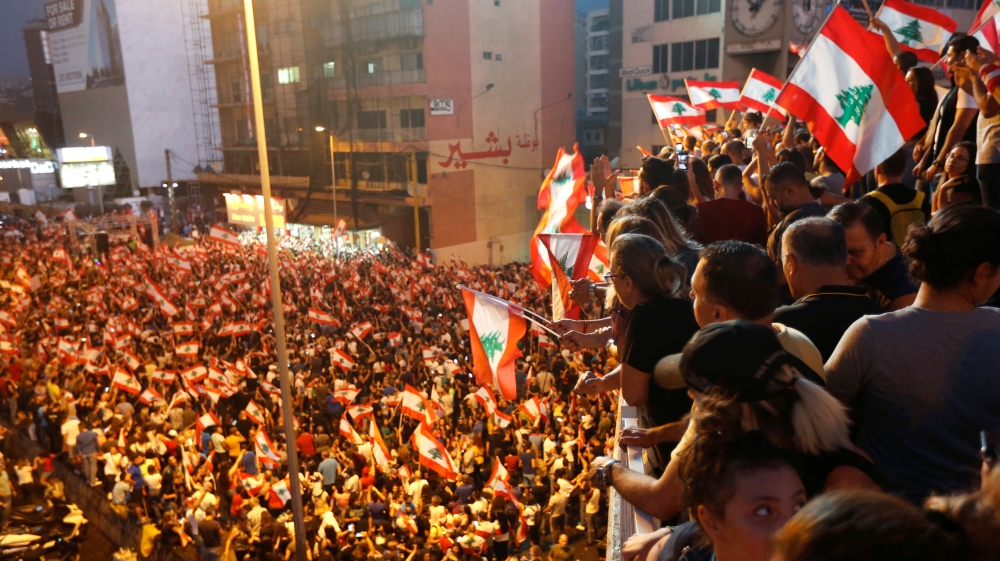

![Demonstrators carry national flags and banners during an anti-government protest along a highway in Jal el-Dib [Mohamed Azakir/Reuters]](https://www.aljazeera.com/mritems/imagecache/mbdxxlarge/mritems/Images/2019/10/22/cca2fb42f5fb4776aa3a0c4ef78d0e5d_18.jpg)

WASHINGTON (Reuters) Humeyra Pamuk – Lebanese people are “rightfully angered” with their government over its refusal to tackle corruption and Washington supports their right to demonstrate peacefully, a senior U.S. State Department official said on Wednesday. Lebanese army soldiers confront with demonstrators in an attempt to open a blocked road during ongoing anti-government protests in the port city of Sidon, Lebanon October 23, 2019. REUTERS/Ali Hashisho Hundreds of thousands of people in Lebanon have flooded the streets for nearly a week in an unprecedented wave of demonstrations, furious at a political class they accuse of pushing the economy to the point of collapse. Describing the protests “long overdue”, the official called on the Lebanese government to carry out the economic reforms demanded by the people, adding Beirut should not get a “bailout” from the crisis. “The people in Lebanon are frustrated. The crowds that are coming out are enormous…and people want to see action. The United States government supports their call for action for reform for fighting corruption,” the official told reporters. “This is not a new problem. The economic crisis that Lebanon is currently facing was a slow train coming.”
Flag-waving protesters kept roads blocked with vehicles and makeshift barricades for a seventh day on Wednesday. Banks have been closed since Friday and will remain shut on Thursday, the banking association said. Schools are also closed. Prime Minister Saad al-Hariri’s government announced an emergency reform package on Monday to try to assuage public anger and steer the state away from a looming financial crisis. Washington was in routine contact with their Lebanese counterparts but was not up to the United States to tell Beirut what to do, said the official, who spoke on the condition of anonymity. “It remains to be seen whether the Lebanese people will accept what’s been tabled,” he said. “We have been talking with them about reform for a very long time.”
Sources said Lebanese leaders are discussing a possible government reshuffle to defuse the protests. Lebanon’s highest Christian Maronite authority and a prominent Druze politician threw their weight behind the groundswell for change, calling for qualified technocrats to be included in any government shake-up. In a statement on Tuesday, the French government urged Beirut to carry out the reforms, which are key to unlocking some $11 billion in financing pledged by France and other countries and lending institutions last year. The official said Washington saw the announcement of the emergency reforms but they needed to be put in action for the financial package to be rolled out. “Funds will be released when these reforms are enacted and implemented,” he said. Reporting by Humeyra Pamuk; Editing by Sandra Maler, Cynthia Osterman and Lincoln Feast. Our Standards:The Thomson Reuters Trust Principles. MORE FROM REUTERS

Lebanese Former Prime Minister Billionaire and Top Bank Accused of Illicit Gains
by Bloomberg — By Dana Khraiche — A state prosecutor accused former prime minister Najib Mikati — Lebanon’s richest man — and the country’s biggest bank of making illicit gains from a subsidized housing program, in the first corruption case filed since anti-government protesters took to the streets a week ago. The lawmaker, his brother Taha and his son Maher, as well as Bank Audi, are alleged to have illegally benefited from loans subsidized by the central bank to help ordinary families buy their own home, the state-owned National News Agency said. The illicit gains law in Lebanon criminalizes profits made through bribes or abuse of public office. The case against Mikati marks the first time it has ever been implemented, according to monitoring group Legal Agenda.
Bank Audi said it complies with the law and denied playing a role in any scheme to reap illicit gains, according to a statement. Mikati, whose fortune is estimated at $2.5 billion by Forbes magazine, said he was ready to face any legal proceedings and open his books to scrutiny. He said the charges against him were politically-motivated and instigated by President Michel Aoun. “There is nothing hidden,” he said.
The Mikati family had taken loans to buy two apartments under a central bank program that aimed to encourage investment spending by capping the interest rates charged by commercial banks at 6%, his office said. The purchases were made prior to the introduction in 2013 of the central bank-subsidized loan program that was managed through the Public Housing Institution and was valid only for properties worth $500,000 or less. “The above explains clearly that the Mikati Family has contracted a traditional commercial residential loan that has nothing to do with the subsidized loans in Lebanese Pounds allocated to people with low income,” his office told Bloomberg. Mikati and his billionaire brother — the two wealthiest men in Lebanon — co-founded the Beirut-based firm M1 Group, which has investments in telecommunications companies in South Africa, and other holdings in Monaco, London and New York. They hail from Tripoli, which has some of the country’s highest poverty rates, and has witnessed some of the biggest protests.



